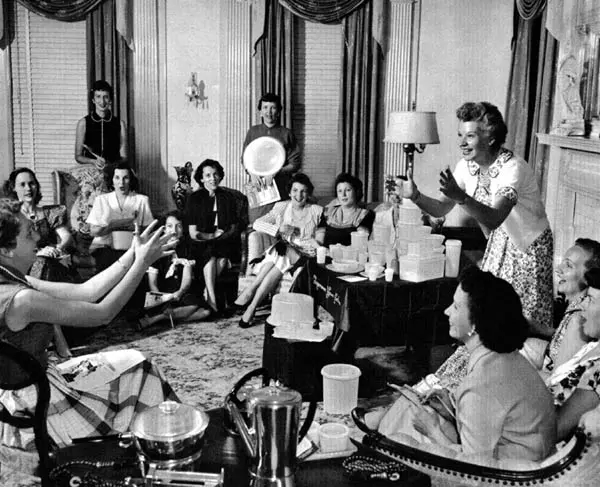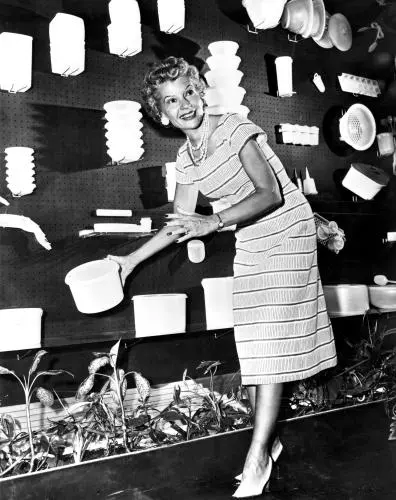In 1948, Earl Tupper introduced a new brand of airtight containers called Tupperware that allowed for food to be preserved and stored for longer periods of time.
No one really cared.
The revolutionary plastic containers with the patented “burping” seal sat on store shelves, and the company based in Leominster, Massachusetts saw little growth.
A woman named Brownie Wise came up with a marketing strategy that involved hosting home parties to demonstrate the many uses of Tupperware in a fun setting. She would train other women to host parties themselves, providing them an opportunity to earn money based on their sales.
Tupperware sales exploded around the country and in 1951, Wise was named vice president of marketing for the company. She spearheaded the effort to move the company headquarters to Central Florida, where it is still located today.
“Brownie was arguably the most important American businesswoman of the twentieth century,” says Bob Kealing, author of the book Tupperware Unsealed: Brownie Wise, Earl Tupper and the Home Party Pioneers. “Brownie made it okay for women to make their own money.”
Wise became a symbol of the idealized, all-American suburban housewife of the 1950s, but was actually empowering women. Her home party system allowed women to work on their own schedules. Wise did not consider herself to be a feminist. She said that she was just a single mother trying to make money to raise her child.
“She gave women a road map to their own liberation in a way, getting them out of the kitchen, giving them an opportunity to make a financial contribution to their family’s well-being,” Kealing says.
Wise’s cult of personality became as important to the success of Tupperware as the quality of the product itself. Her celebrity grew throughout most of the 1950s, and she was the first woman to appear on the cover of Business Week magazine.
Tupperware’s Florida based operation began in 1951, in a World War II era hangar at what is now the Orlando Executive Airport. Within a year, the company relocated to a large facility in Kissimmee. Wise began hosting extravagant “jubilees” on the property to recognize the Tupperware Party hosts making the most sales.
“Brownie Wise had this remarkable ability to communicate with her dealers and inspire them,” says Kealing. “They would compete to win her dresses and lose all kinds of weight to fit into them as prizes, because that recognition from her was so important. She had this almost mystical power and connection with her dealers.”
Although the company no longer has a charismatic leader to equal Wise, Tupperware continues hosting “jubilee” rallies in major cities, rewarding outstanding participation in product sales.
Despite incredible sales figures for Tupperware products in the early and mid-1950s, Earl Tupper began to resent the fact that Wise was the public face of the company.
“Earl Tupper thought with her growing celebrity that she was taking her eye off the ball a little bit, and forgetting that his baby, Tupperware, was the real star of the show,” Kealing says. “That’s where the trouble started.”
Tupper unceremoniously fired Wise just before he sold his company in 1958, and essentially wrote her out of the corporate history. Wise was largely forgotten until Kealing wrote her biography in 2008.
Kealing’s book “Tupperware Unsealed: Brownie Wise, Earl Tupper and the Home Party Pioneers” is being made into a film starring academy award winning actress Sandra Bullock. This summer, an expanded and updated version of the book is being published with the title “Life of the Party.”
Wise paved the way for other pioneering businesswomen.
“She had the template for what most successful businesswomen do today,” says Kealing. “She was known by one name, Brownie. She was pre-Oprah Winfrey, she was pre-Martha Stewart. These days it would just be accepted that you write your own self-help book and that you’re on the cover of all sorts of magazines.”
Wise did not graduate from high school, but went on to become a successful leader in a multi-billion dollar corporation. Perhaps her greatest legacy is the impact that she had on others.
“She would inspire women to go out and do things that they never felt capable of doing,” Kealing says.

